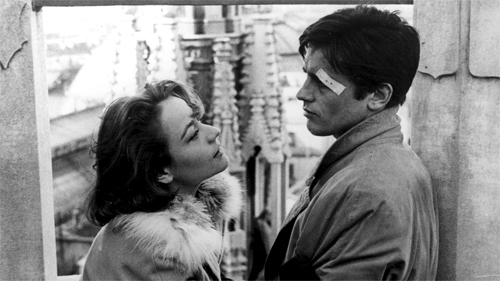Imagine celebrating your recent engagement to the classy and beautiful daughter (Claudia Cardinale) of Milanese bourgeoisie in their small but tasteful apartment in their home city. Wine, appetizers and boisterous conversation flow freely, and you look singularly handsome and promising in your Italian suit.
Filial piety and moral decay
Imagine celebrating your recent engagement to the classy and beautiful daughter (Claudia Cardinale) of Milanese bourgeoisie in their small but tasteful apartment in their home city. Wine, appetizers and boisterous conversation flow freely, and you look singularly handsome and promising in your Italian suit.

Suddenly, your recently widowed mother and four brothers arrive at the door after having traveled by train from their impoverished farm town in Italy’s deep south and barge in. They accuse you of disrespecting your deceased father by wearing a white flower in your hair, demand that you take care of them all and derail your impending marriage.
This is just the beginning of Luchino Visconti’s 1960 film, Rocco and His Brothers.
What follows is a nearly three-hour odyssey of big family dynamics in post-war Milan. The family moves into a concrete-block basement apartment and the brothers find jobs. Simone, one of the older brothers, immediately shows potential as a scoundrel, which he lives up to quite well. The beds are thin, the clothing thinner and the weather cold.
Yet the sweaty, too-close family dynamics are amplified by the bold intrusion of the brassy and comely prostitute Nadia (Annie Girardot), who flirts with them all before settling on the muscular lout, Simone. Their romance provides the dynamic that moves this whole film forward and rattles the family to the bone.
The film is about boxing, sex, vice and crime. It is about filial piety and a mother’s eternal love. But mostly it is about the eternal fallibility of the human spirit. If Simone is predictably degenerate, what can we say about Rocco (Alain Delon), whose passivity and misguided reverence for his older brother predictably leads to the death of the woman who loves him and the end of the family’s honor?
The high-pitched drama is amplified by the vigorous, sing-songy Italian language. Read the subtitles quickly; they often have a hard time keeping up with the frenetic pace of the dialogue. The character’s vocal range is evidently stretched as they converse, laugh, cry, scream, curse and croon silently into one another’s ears.
The cinematography borders on the noir, and even when the scenes are sunny, the character’s dispositions are decidedly less so. But throughout the ordeal, the men are manly, the women beautiful and the heart quintessentially Italian.
Rocco and His Brothers (1960)
Friday and Saturday, March 23–247 p.m.
Whitsell Auditorium (1219 SW Park Ave.)
$9 general admission;
$8 Portland Art Museum members, students and seniors







